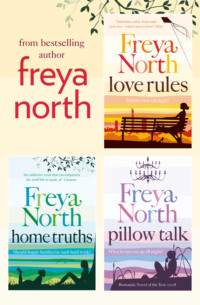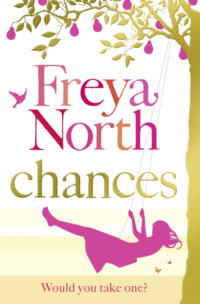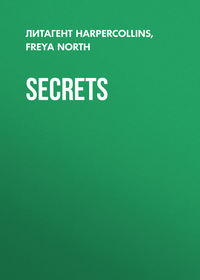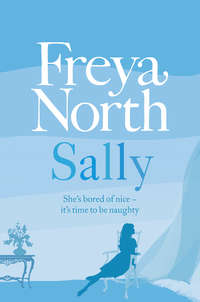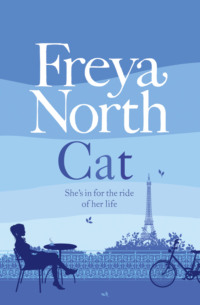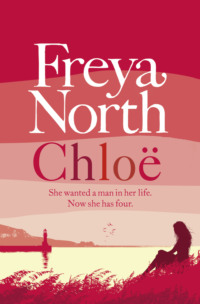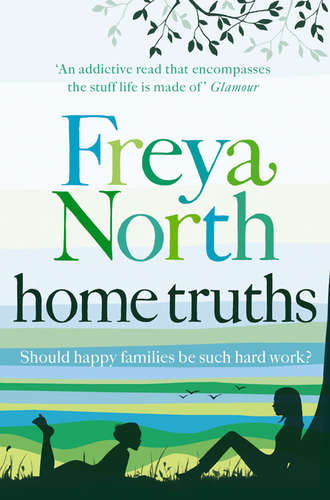
Полная версия
Home Truths
‘Banana, double fudge – half fat. Delicious, hey? You want a scoop?’
Penny glanced swiftly along across the colourful tubs like a pianist travelling the length of a keyboard with a single finger. ‘You know what,’ she said, ‘actually I think I’ll sit and have a sundae.’
‘You take a load off,’ the woman encouraged her. ‘Menus are on the tables. Juliette’ll be right over.’
Aren’t the staff great, Penny thought, they give you long enough with the menu so that you’re truly salivating and desperate to order. ‘I’ll have Chippy Chippy Bang Bang, please,’ she said, just as soon as she was aware that the waitress hovered, ‘with hot chocolate sauce. And nuts. And Lucky Charms. Hell, why not.’
The waitress brought over the sundae, perfectly presented in a pretty frosted dish, oozing with sauce and smothered in extras.
‘Enjoy,’ she said.
‘Oh, I will,’ Penny assured her, ‘thank you very much.’ She sensed the waitress linger, so with the long elegant spoon she dug up a glut of sundae and held it aloft as if to say cheers. Penny experienced a sensory burst that was delicious and exquisitely sweet and intensely painful. She closed her eyes. She closed her eyes to appreciate the taste. She closed her eyes because it hurt, because she suffered from sensitive gums and always seemed to forget the fact where ice cream was concerned. She closed her eyes because she used to bring Bob here when ice cream was the only thing he found digestible and that didn’t taste metallic from the chemotherapy. That was the sweetest thought, and that’s what hurt the most.
When Penny left, leaving an empty dish and a grateful tip, the waitress Juliette who had served her turned to Gloria behind the counter.
‘I recognize her – do you?’
‘Not especially,’ Gloria said.
‘Sure you do – she used to come in, with her husband I guess. You do remember him. He was sick. They used to sit right there. Sometimes she’d spoon it for him, feed him. Like a child.’
‘Hey, I do remember,’ said Gloria, ‘but that was a few months back.’
‘Yes. But today she comes in on her own,’ Juliette said.
‘You think he died?’
‘I guess,’ said Juliette. ‘Sad.’
Noni invited Penny to the cinema again the following week but Penny thanked her and declined, citing other plans. She took herself back to the ice-cream parlour, which was no less empty though the day was dull and the weather was now too cold to snow.
‘Hi,’ said the counter waitress, ‘have a taste.’ The pink spoon, today laden with an ice cream the colour of coal, was passed to Penny.
‘Liquorice,’ Penny said, having assessed it with the commitment of a sommelier.
‘And?’ said the waitress.
Penny tasted it again. ‘I’m not sure – there’s something. I can’t—’
‘Raspberry.’
‘Raspberry,’ Penny marvelled, ‘and liquorice. Fancy that.’ And she went to the same table she’d sat at the week before. The one in the window, furthest from the table in the corner she used to seat Bob at.
‘Hi, I’m Juliette,’ the younger waitress came over to take her order. ‘How are we today? You set?’
‘I’m good,’ said Penny, ‘and I’d like a scoop of that liquorice one.’
‘You should get a sherbet with that – brings out the flavour.’ Juliette was quite forthright about that. Penny looked up. The girl looked like a confection herself, in her uniform striped the colours of apricot and strawberry, her hair in a high pony-tail, a jaunty little pink-peaked thing on her head, her name in copperplate across it. ‘I’d recommend lychee,’ Juliette said and Penny nodded.
When Juliette brought the bowl over, Penny took a small taste and nodded her approval. Her gums didn’t seem so sensitive today. She didn’t have to close her eyes so often. But there again, she’d abstained from hot chocolate sauce or candy toppings. And Bob had not liked liquorice at all. She felt relaxed, as though she needn’t scurry away just as soon as she finished. So when the waitress suggested a cup of coffee, Penny accepted.
‘Excuse me, ma’am,’ the waitress said after placing the cup and turning the saucer so that the handle was correctly placed. Penny looked up and read the girl’s name again. Juliette. Well, Juliette looked a little concerned. ‘I don’t mean to – well, Gloria and I, we just. We remember you from the summer, from the fall. You used to come in with the gentleman? He was – he was.’
How old? Penny thought. Early to mid-twenties, she guessed. Nice-looking in a plain way, perhaps nicer-looking on account of her politeness and her slightly shy sweetness.
‘Is he?’ Juliette was bending down a little, as if in a reverential curtsy. ‘Was he?’
‘He was my husband,’ Penny told her. ‘He died. Near enough two months ago.’
‘Oh I’m so sorry,’ said Juliette, instinctively clutching her heart for emphasis. It touched Penny. It was as if everyone, no matter how little they knew Bob, had been rooting for him to pull through.
‘Thank you,’ said Penny. ‘He sure loved this place.’
Penny returned two days later. Not to avoid any social invitation, nor because she had a craving for ice cream, but because Fountains felt like a nice place and seemed a good space to be. Comfort and warmth. Lovely warm chocolate sauce. Beautiful, pastel-coloured candy. Ice creams whose names brought a smile. Everything sweet. If you licked the blossom-coloured walls or bit the backs of the chairs, you’d probably discover they were made from candy. Everything there was sweet. The staff especially. They were like a personification of some of the ices. Pink Wink. Smile Sweetie.
When Juliette brought over Honey in Heaven, with chocolate sauce and marshmallows, Penny spooned into it but then spoke before tasting. ‘We were married thirty years nearly,’ she said. She looked up. Juliette didn’t seem taken aback by the information, her expression invited Penny to continue. ‘He called me dear. Always did, right from the start. Good morning, dear. Well dear, I’ll be off to work now. I’m home, dear. What a nice supper, dear, shall I fix the coffee? It may have sounded formal, but I always heard it as charming and old-fashioned.’ Penny tasted the ice cream. Heavenly indeed. She had two more spoonfuls but Juliette stood beside her, quietly attentive. ‘I guess you wouldn’t call us a lovey-dovey couple. But we were a good team.’
Juliette was shaking her head shyly. ‘I watched you feed him,’ she said very quietly. ‘That’s far more beautiful than lovey-dovey. It must be so hard – but I guess it’s a blessing that his suffering should be over, that he is at peace.’
‘I’m not a superstitious type,’ Penny said, working her spoon busily against the sundae as she spoke, ‘I don’t believe in astro-mumbo-jumbo, I pooh-pooh voices from the dead, I don’t do karma and yin-yang spirit guides; you know? But when Bob was fading I’d whisper to him, over and over, Find a way, Bob, find a way to be with me. Stay in touch. Send a message. Show me a sign. Promise me?’
‘I believe,’ Juliette confided with quiet earnestness, while Penny ate.
‘Nothing,’ Penny said gruffly as if disappointed by Juliette’s response. ‘I haven’t seen any signs, I haven’t felt warmth – nothing at all. Just the icy emptiness of being on my own.’ Her hand formed a fist around the spoon, the skin so taut across her knuckles they looked like the snow-sharp mountains outside. ‘There is no blessing,’ she ridiculed. ‘He shouldn’t have suffered in the first place. Death is not a good thing. It’s very cruel and it’s a waste.’ She didn’t finish her ice cream and she didn’t leave a tip. And she didn’t go again the following week.
But she did return the week after that. And she felt her eyes smart at the bright sweetness of the welcome Juliette gave her. Fountains, she decided, was better than any support group. ‘Hey stranger, you missed out on Chuckle Berry last week. Gloria will give you a taste. You sitting?’
Penny sat. She managed to make the sundae last an hour and at any opportunity, she passed the time with the waitresses about the weather, or about ice cream. Then she ordered coffee. And a refill. She was obviously lingering but no one, herself included, was quite sure for what.
‘My father passed,’ Juliette told her, when she accepted a second refill.
‘I’m so sorry,’ Penny said, genuinely shocked. She’d practically forgotten that grief could befall other people. ‘Can you sit awhile?’ Penny asked. Juliette glanced around the parlour, raised her eyebrow at Gloria who gave her a nod. ‘When?’
‘Coming up to a year and I need to tell you that I think death is a great thing. He was a rotten drunk and he hurt me and my mom. So I guess I envy you a little,’ Juliette said with a reluctant smile. ‘Not your pain, not the longing that must weave the minutes into the hours and drag your hours into these dark days right now. But I envy you the fact that your loss is so great because your love itself was so great. I never had that.’
Penny didn’t know where to put herself. For the first time she experienced the guilt that she assumed her own friends were feeling. The guilt at one’s own good fortune. She put her hand over Juliette’s wrist because she was lost for words. She didn’t know what to say because recently Bob was all she really talked about. Just then, though, she wasn’t actually thinking about him at all.
Road Kill
Pip butters toast, Zac is skim-reading the Financial Times and the Today programme drifts sedately through the kitchen; not loud enough to be an active part of breakfast but audible enough to be an integral component in their morning routine. Pip knows to savour these few minutes before Tom breaches the peace.
And here he is. Hastily dressed for school. His nine-year-old physique spurting in fits and starts; just recently his feet have apparently doubled in length yet the softness of his peachy cheeks remains unchanged from when he was a toddler. His fingernails exhibit the indelible grubbiness commensurate with a boy of his age but the pale pitch of his voice seems so pure and clean. His hair truly has an energy of its own and Tom is not yet of an age to exhibit much interest in styling or even basic control. Consequently, it tufts itself into increasingly haphazard configurations, caused as much by spasmodic keratin production as by the freedom of such deep sleep. Today, it resembles something that the forefathers of punk rock spent hours trying to achieve.
‘Happy St David’s Day,’ Tom announces. ‘We’re doing it in school today.’
‘Good Lord,’ Pip declares, ‘it’s the mad March hair.’
Zac looks up from his paper. ‘Or the mad March heir,’ he quips though neither Pip nor Tom cotton on to the pun. It’s too early to hear silent ‘h’s. It’s too early to have to explain, thinks Zac, returning to the pink pages.
Pip attempts to smooth down Tom’s hair with her hand. He shirks away and ruffles up Pip’s meddling. ‘Toast?’ she asks.
‘Yep,’ Tom says. Zac glances over his paper. ‘Please,’ Tom adds with a sigh.
‘Do you want to go through your piece?’ Pip asks.
Tom looks alarmed. ‘My piece?’
‘For assembly this morning? On the patron saints of the British Isles. Aren’t you St George?’
‘Oh. That. I thought you meant my piece of toast,’ says Tom. ‘Digby says that the dragon is a metaphor. But he doesn’t even know what a metaphor is.’
‘And do you?’
‘No,’ says Tom, ‘but it sounds boring, like something Miss Balcombe would go on about. And on and on. Yawns-ville.’
‘Well, would you like to go through your piece about St George?’ Pip asks.
‘I know it off by heart,’ Tom says proudly, and launches into a fast, monotone delivery. Pip can see the Financial Times quivering. She surreptitiously kicks Zac under the table. Tom finishes his recitation to applause from the table and the 8 a.m. GMT pips from the radio.
‘If babies are such a great thing, if they’re such a miracle and stuff – why do they make their mums so poorly and so mega grumpy?’
Pip wasn’t prepared for this. Usually when she walked Tom to school she was entertained with a diatribe of the personal hygiene habits and physiognomic misfortunes of his teachers, which merely required tuts of her disapproval whilst she bit back laughter.
‘Seems a bit stupid to me,’ Tom continued darkly. Pip wasn’t sure what to say. Was Tom about to probe for the facts of life? She felt uneasy, having not yet discussed with Zac the information and terminology he was prepared to give his son. ‘Did I do that to her, to my mum, do you think? When she was having me, did I make her puke like mad and be a grumpy old moo?’
Tom was asking Pip about something on which she had actually no authority to answer. ‘Perhaps,’ she answered cautiously, having never actually discussed the vagaries of June’s first pregnancy, ‘but excuse me, young man, your mum is not an old moo.’
‘But she is grumpy,’ Tom muttered. ‘I thought she would be chuffed about having a baby but all she does is grumble and puke.’ He allowed Pip to take his wrist as they made to cross the road. ‘There’s going to be buckets of blood too, of course, when the baby comes. And do you think Mum’ll scream her head off – like that woman on Holby City last week?’
Pip couldn’t really answer that one, not knowing June’s take on epidurals.
‘I can see why you don’t want all that madness,’ Tom said darkly, with much sage nodding.
‘Pardon?’
‘You and Dad,’ Tom shrugged. ‘Don’t tell my mum I said stuff like that about her and stuff.’
Pip and Tom were about to step off the kerb when they saw the squirrel. Tom was still young enough to point and declare ‘Hey! Squirrel!’ as it bolted into the road. And then came the car at the same time and they both foresaw the death of the squirrel by a second or so.
‘Oh God,’ Pip gasped, helpless not to be transfixed by the spatter of guts, the barb of torn limbs, the stark stare of sudden death.
‘Gross!’ Tom said, not quite sure if he was thrilled or distraught.
‘We’ll cross the road further down,’ Pip said.
‘Do you think it’s really dead?’ asked Tom.
‘Yes,’ said Pip, ‘I do.’
‘Oh.’
‘Poor little thing.’
‘Poor little thing. Do you think it was a boy or a girl?’
They crossed the road and Pip began to gamely tell Tom that babies didn’t cause their mums to feel poorly and be grumpy, all that was down to chemicals causing a lady’s body to be able to grow and carry a baby. And anyway, mums and dads so want to have babies that a bit of yukkiness now and then didn’t matter at all in the long run.
‘Tom?’
Tom was quietly sobbing though the school gates were in sight.
‘Your mum is fine – please don’t you worry about her. She doesn’t mean to be grumpy and she can’t help feeling a bit yuk.’ Pip gave Tom a hug. ‘Do you want your dad to talk to her? I promise you she can’t wait to give you a little baby brother or sister.’
‘Not the baby,’ Tom sniffed, ‘the squirrel.’
happy st david’s day!!! Pxxx
Fen stared at the text message Pip had sent her and wondered for a moment whether St David’s Day was something she’d forgotten that they celebrated despite having no Welsh blood in the family. Funny old Pip, Fen smiled, texting back.
and to you. F + C xx
Fen knew Pip would start to text her at length but soon tire of the thumb effort and phone her instead. The call came a couple of minutes later.
‘Happy St David’s Day.’
‘Same to you, with bells on.’
‘What are you up to today?’
‘Oh, the usual – puréeing things, changing nappies, singing daft songs, spending the afternoon with women I have nothing in common with other than postcode and the fact that our babies were born in the same month.’
‘Shall we meet up, then? I’m not clowning today – and I’d love to see Cosima. And you.’
Fen looked around her home. It was a tip. She ought to prioritize the chores and say no. ‘OK,’ she said, ‘that’ll be lovely.’
‘Kenwood?’ Pip suggested. ‘It’s equidistant. Let’s have coffee and cake. See you in an hour or so?’
Fen looked at the clock. It was ten o’clock and though Cosima was dressed beautifully in Catimini, Fen was still in her dressing gown. She opened her wardrobe and perused her pre-pregnancy Agnès B skirts and John Smedley cardigans. It was a perverse, masochistic ritual she taunted herself with almost daily. She didn’t dare hold them against herself, let alone try them on; scrambling instead into yesterday’s cargo pants. Packing Cosima in a snowsuit that made the baby resemble the offspring of the Michelin Man and Laa-Laa the Teletubby, Fen crammed essentials and non-essentials into the changing bag and just about remembered to grab her own jacket before heading out of the house.
Big Red Bus, Cosima!
Look at that little fluffy doggie!
Can you see the blue car, baby girl? Yes, it is a blue car, a nice blue car. Blue, blue, blue car blue.
Walking through East Finchley, Fen and Cosima passed buses and dogs and cars of various descriptions. However, there was little to point out to Cosima about the Bishops Avenue other than Great Big Houses and Great Big Trees and Great Big Cars.
But then Fen saw the young man with the flowers.
She slowed her pace. He was some distance ahead, fixing a bunch of flowers – tulips, they looked like – around the trunk of a tree. Fen was captivated; how often had she passed by a tree, some railings, displaying a bunch of bedraggled flowers as a memorial to a life lost? But such flowers had simply been there and, usually by the look of them, for quite some time. Had she ever actually seen someone placing such flowers? No, she hadn’t. Had she ever seen flowers tied to this tree-trunk? She didn’t think so. Not until today. She was approaching him, the man now fixing a bunch of daffodils alongside the tulips. Fen was close enough to see that some had orange trumpets, others white; a cut above the bog-standard yellow for sure.
Should I cross the road? Should I treat him as the bereaved – give him space and peace so he can have his ritual as solemn as is fitting? He looks so young. Who did he lose?
And the young man was offering a daffodil with a broken stem to Cosima. ‘Happy St David’s Day,’ he was saying.
‘Oh!’ Fen chirped. ‘A lovely flower! A lovely daffodil. Are you Welsh?’
‘No. Will she eat it if I give it to her?’ the man asked.
‘Probably,’ said Fen.
‘Here, you have it, then,’ he said, worrying his hand through his already tousled jet black hair as if he was genuinely concerned. ‘Put it in her room. Or something.’
‘Oh. OK. Thank you.’
The man paused. ‘My sister would like it.’
Fen looked at him. Christ, how awful. Suddenly she wanted to know details; how awful. She should say something. ‘I’m sorry for your loss.’
‘Thank you,’ the man said, and he genuinely seemed touched. ‘She was twenty and was killed three years ago. My mum lives in Manchester and I’ve promised her that I’ll replenish the flowers each anniversary.’
‘Was it a car?’ Fen asked, cringing that this sounded both tactless and interfering.
‘No, a motorbike,’ the man said.
Fen regarded him. He was fresh-faced and slightly gawky, looked as though he should be putting up leaflets about drama soc at Oxford or Cambridge, rather than road-kill flowers in East Finchley. How old was he? Early twenties? Had he been a younger or older brother to his late sister? ‘How long do the flowers last?’
‘Longer than in a vase, bizarrely,’ he replied, ‘but I hate seeing commemorative flowers all withered and limp. I always come back and check. I take them down before they’ve passed their best. You could say my sister was in full bloom when she was cut down. So I don’t think she should be remembered any other way.’
‘What was her name?’
‘Kay. What’s your name?’
‘Fen.’
‘Short for Fenella?’
‘Yes,’ said Fen, charmed. ‘Not many people know that.’
‘I was at college with a Fenella.’
‘What’s yours?’
‘Al.’
‘Short for Alan?’
‘No, Alistair.’
‘Ah.’
‘Know any Alistairs?’
‘Nope, you’re my first.’
‘What’s the baby’s name?’
‘Cosima.’
‘That’s pretty.’
‘I think some people think it’s a bit pretentious.’
‘Is the mum a bit arty-farty then?’
‘The mum?’ Fen was simultaneously shocked and charmed again. ‘I am the mummy.’
‘No way! I thought you were the nanny.’
‘No. I’m the mother all right.’
‘Cool. I see. Wow.’
There followed a pause that was simultaneously awkward yet heightened as they both scrambled around for some other common ground, just something to say, to prolong conversation.
‘Anyway, we’d better go – we’re meeting my sister at Kenwood,’ Fen said, as if she’d been miles away and had suddenly come to. ‘It’s been nice talking to you. And I’m sorry – about Kay.’
‘Thanks. Thanks. Nice to meet you too – and Cosima. How old is she?’
‘Eight months old,’ said Fen, now really wanting to know how old Al was and whether he was younger or older than his late sister. They’d paused too long for her to ask now. ‘Bye, then,’ she said, a little reluctantly. And just a little coyly too.
Fen walked on. She stopped and turned. Al was looking after her. She waved and he raised his hand. She strolled onwards to Kenwood House, breaking into a sudden grin every now and then. Flattery. How good it felt. ‘I don’t know whether to be charmed or insulted,’ she said to Cosima as she walked. ‘I thought I had “Frumpy mum” written all over me.’
The unusual incident, the unexpected attention of a stranger, the break from the drag of just a normal day, served as a tonic that Fen wanted to keep private for utmost potency. So when Pip said how bright she looked, Fen didn’t mention Al. She didn’t say that attraction is a peculiar, sly thing that can work wonders on the complexion. She pointed instead to a good night’s sleep at last and that Cosima had gobbled up pear purée that morning that had no orange tinge to it whatsoever.
‘It wouldn’t be wise to tell Auntie Pip anyway,’ Fen chattered at Cosima as they walked back. ‘Auntie Pip would only give me her worried look – her “Motherhood has made my sister loopy” look.’ Fen stopped at Al’s flowers. Cosima was fast asleep. Fen tucked the fleece around the baby and stroked her cheek. ‘I feel a bit ambivalent that I should feel just slightly flattered that Al thought I was the nanny, not your mother. He said “Wow” when I corrected him. What did that “Wow” mean exactly? That I look good for my age? That I’m a yummy mummy? That I’m the first person he’s met with an eight-month-old baby? I can’t remember the last time I wowed someone. Daddy just calls me silly.’
Waterworks
‘Mr and Mrs York! Mr and Mrs Holmes and Master Holmes! Mr Holden, Ms McCabe, Miss Holden-McCabe! Welcome one and all.’ Django genuflected flamboyantly throughout his roll-call, much to everyone’s amusement. He was wearing the jeans he’d worn to Woodstock, tessellations of denim patchworked together, teamed with a shirt swirling brightly with paisley motifs. His belt was all buckle, in the bashed bronze form of a mounted Red Indian, bow and arrow poised. Pip had seen similar go for princely sums on ebay. ‘Cuppa tea? Something to dunk?’
‘Can I have squash?’ Tom asked, but directed the question to his father. ‘And something to dunk?’ Although Django was certainly the most exotic adult he knew, Tom still passed all requests via his father first.
‘You can, my boy, you can,’ Django responded to Zac’s nod, ‘but you’ll have to tell me how to squash it – I’m sure to have the ingredients.’
‘You just untwist the bottle top, pour in about a centimetre and then top it up with water. Even water from a tap,’ Tom explained helpfully despite being somewhat incredulous. It occurred to Django only then that they were talking different types of squash. He realized with some relief that he needn’t attempt to juice the pumpkin. And he realized with some disappointment that he did not own the bottled cordial to which his step-grandson-thing-or-other alluded. Good job, really, because he hadn’t a clue what a centimetre was anyway. A dash he knew intrinsically, a dollop too; he could do a smidgeon blindfolded and had always denounced the pinch as miserly. Feet and inches he was fine with, metric however was another matter; one he staunchly felt did not matter. ‘I have some cherry syrup,’ he said quietly to Zac. ‘Do you think that might do?’


